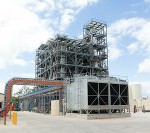Re-refiner urges miners to do the right thing
It’s one of the mining industry’s dirty little secrets. Away from the self-congratulatory puff of their sustainability reports, miners burn millions of litres of used lube oil every year, lube oil that could be re-refined and re-used.
Waste oil refiner Southern Oil and its partner J.J Richards & Sons, which have just spent $55m on a Gladstone plant that can re-refine up to 100 million litres of waste lube oil a year, are urging miners to do the right thing.
Southern Oil managing director, Tim Rose said at the recent opening of the Northern Oil Refinery (NOR), situated at Yarwun near Gladstone, “We need strong support from waste oil producers like mines and local governments to direct their waste lube oil to be re-refined, rather than burned and wasted which is what mainly happens now.”
Rose says the new NOR plant, which took 20 months to construct, is the only facility in Queensland capable of recycling waste lube oil back into base lube oil. Southern Oil already operates a similar plant at Wagga Wagga in NSW; it handles waste lube oils from Hunter Valley mines.
According to Rose the high-end re-refining process to recover base oil for re-use is the most environmentally responsible treatment of waste lube oil.
About 350 million litres of waste lube oil is collected in Australia every year. Wastefully, 60 per cent is burned and 24 per cent is exported to be burned overseas, mainly in Asia, releasing large amounts of carbon into the atmosphere in the process.
“Waste oil is a hazardous substance that has enormous potential to do harm if not collected and treated properly,” Rose said.
“Burning waste lube oil as fuel destroys a valuable commodity, permanently removes lube oil from productive use and releases large amounts of carbon into the atmosphere.
“Re-refining sits at the top of the waste management hierarchy and secures an environmental and economic value for used oil, to achieve the highest beneficial re-use for Australia.
“With the addition of NOR, we are able to process 38 per cent of Australia’s waste lube oil – sourcing from the 84 per cent which is burned – and reduce Australia’s reliance on oil imports.”
Southern Oil says its re-refining process is a “cradle to cradle” treatment of oil that removes all contaminants and restores the oil to its original condition. The contaminants, such as dirt, water, fuel and used additives, are removed through vacuum distillation. The oil is then further treated to remove any remaining chemicals to provide consistent oil quality to international standards.
Under the partnership with J.J Richards & Sons the waste oil will be collected from the site of the waste oil generator and transported to an aggregation facility where it will undergo primary treatment before being taken in bulk to the Gladstone re-refinery.
And with mining companies and governments looking to set higher environmental benchmarks, NOR could become a point of difference in setting and achieving sustainability reporting goals.
At full operational capacity, Rose says the plant will reduce Australia’s greenhouse gas emissions by about 290,000 tonnes every year and will offset the average Australian’s lifetime production of greenhouse gas emissions every two days.
“Each tonne of oil burned releases 2.92 tonnes of CO2 into the environment,” Rose said.
“If all of Australia’s collected waste oil was re-refined instead of burned, greenhouse gas emissions would be reduced by about 1 million tonnes per year.
The Australian Council of Recycling (ACOR) described NOR as an investment in manufacturing, in regional Australia and in a greener future.
“This facility is the best of its kind in the world and an example of what can be achieved in sustainable development in Australia,” ACOR chief executive officer Grant Musgrove said.
Rose said Southern Oil was continuing to invest in waste lube oil recycling technology, and had partnered with the CSIRO to develop a new process for the production of Group Two base oils.
“Our product meets the highest of Group One standards and has strong domestic and international markets,” Rose said.
“But we saw an opportunity to move into Group Two base oils and partnered with the CSIRO’s SME Engagement Centre to develop a new re-refinement process to meet this standard.
“We hope to have industrial-scale trials underway this year and be a step closer to offering the best solution for manufacturing both Group One and Two base oils in Australia.”
Source from here

